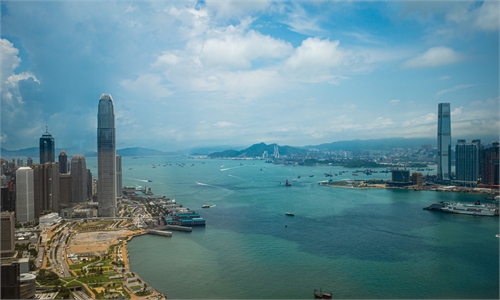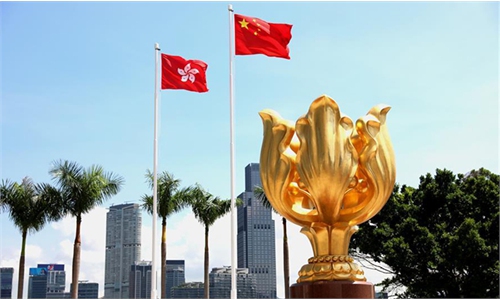Hong Kong begins public consultation on Article 23
A long-awaited, necessary step in plugging national security loopholes, complementary with the NSL for HK: experts

The view of Hong Kong Photo: VCG
Hong Kong announced on Tuesday a public consultation period for the long-awaited Article 23 legislation, which will last till the end of February. The new law, proposed to be titled as the Safeguarding National Security Ordinance, aims to comprehensively address national security risks and will play a complementary role to the National Security Law (NSL) for Hong Kong.
Most of the changes involve refining existing legislation, although new offenses will be added as needed to align with the specific circumstances in Hong Kong, local officials said at a press conference on Tuesday.
Hong Kong Special Administrative Region Chief Executive John Lee Ka-chiu told reporters on Tuesday that the local government proposes the enactment of this new law to address current and potential national security risks in Hong Kong, which is also aimed at fulfilling the constitutional responsibilities and obligations outlined in a decision adopted by China's top legislature on May 28, 2020 and the NSL for Hong Kong.
Improving the national security-related legal framework and law enforcement mechanism would integrate the city's national security laws and provide clarity to the public regarding the scope and content of the legislation, Lee said.
"Today, Article 23 legislation has met the conditions of 'right time, right location, and right people' in the new political environment," Lau Siu-kai, a consultant of the Chinese Association of Hong Kong and Macao Studies, told the Global Times on Tuesday.
Today, after the promulgation and implementation of the NSL for Hong Kong and the implementation of the new electoral system, the anti-China rioters in Hong Kong have no place in the HKSAR's governance structure and society in general, and they are in serious disarray, Lau noted.
"Therefore, the central government, the HKSAR government and the patriotic forces have an open field to guide Hong Kong residents in understanding, agreeing with, and supporting the Article 23 legislation," he said.
The government's proposed consultation paper takes into account the existing laws in Hong Kong, the current situation in Hong Kong, and relevant foreign laws from various countries, Lee said, noting that many nations establish national security laws based on their specific national security risks and needs.
The government will reference and draw insights from the laws of other countries in the legislative process, he said.
Over time, the HKSAR has had longstanding vulnerabilities and risks to national security, providing opportunities for anti-China elements and Western anti-China countries to continuously penetrate and disrupt national security and the prosperity and stability of Hong Kong, experts said.
Incidents such as the illegal "Occupy Central" movement, the 2019 "anti-extradition bill protests," and foreign interference in the Jimmy Lai case highlight the importance and urgency of the Article 23 legislation, Willy Fu, a law professor who is also the director of the Chinese Association of Hong Kong & Macao Studies, told the Global Times on Tuesday.
"In 2020, the central government enacted the NSL for Hong Kong, addressing four categories of offenses, with some overlap with Article 23 of the Basic Law, specifically concerning acts of subversion and secession," Fu said.
While the implementation of the NSL for Hong Kong effectively ensured stability in Hong Kong, the HKSAR government should fulfill its constitutional responsibility by promptly legislating Article 23 to cover the five categories of offenses that are yet to be legislated, the legal expert noted.
"This would plug the gaps in the NSL for Hong Kong and establish a comprehensive legal framework and enforcement mechanism for national security," Fu said.
The Article 23 legislation will provide a legal basis to regulate five categories of offenses including treason, incitement to rebellion, theft of state secrets, political activities by foreign political organizations or groups in the HKSAR, and the establishment of connections between political organizations or groups in the HKSAR and foreign political organizations or groups.
The new law will introduce a new offense of external interference, prohibiting anyone from collaborating with foreign forces to interfere in Hong Kong's elections, legislative, and judicial institutions, Elizabeth Quat, a member of the Legislative Council of the HKSAR, told the Global Times on Tuesday.
Other new offenses will be introduced based on the dishonest use of computers, targeting actions that harm national security through computer or electronic systems, Quat said, noting that she recognizes the necessity of the aforementioned legislation and believes it is forward-looking.
"I'm confident that the Legislative Council will strive to complete the work on Article 23 legislation before the summer recess," she said.




